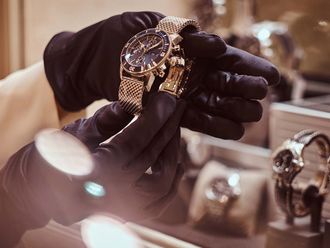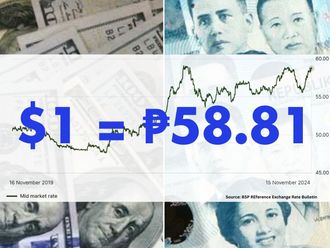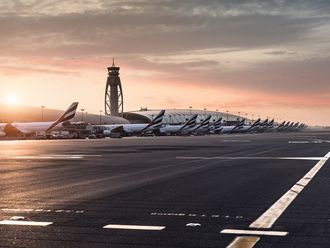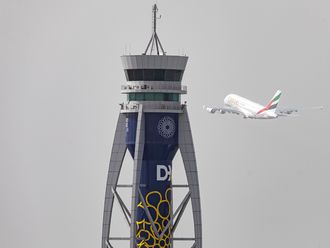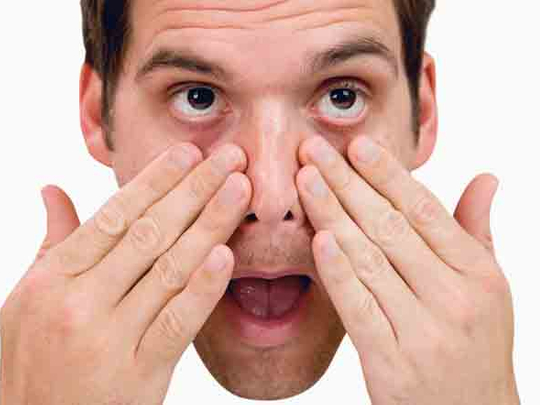
An industry that once catered mostly to women is becoming increasingly popular among Dubai men.
"The number of men seeking cosmetic surgery has increased tremendously. Five years ago I was seeing one male patient a week, around 15 per cent of my clientele. Now there are days when I have all male patients coming in for cosmetic surgery," says Dr Sanjay Parashar, a plastic surgeon specialist at the Cocoona Centre for Aesthetic Transformation.
According to Euromonitor, cosmetic surgery would reach a predicted annual global expenditure of more than $100 billion (Dh367 billion) by 2013.
One procedure that is growing in popularity is breast reduction, otherwise known as Gynaecomastia. This time, however, it's the men that are signing up.
"A good 30 per cent of men are seeking liposuction. A common procedure for men is called male breast reduction which is on the rise because people are getting more conscious. Other popular procedures include botox, liposuction, rhinoplasty, body lifts and hair transplants," says Dr Parashar.
From catering mostly to women, the morphing industry is seeing a lot of new players. Zeina El Haj, founder of Image Concept Dubai inc, a Dubai-based company specialising in Cosmetic Tourism to Lebanon says that her clients are getting younger and younger.
"We are receiving more requests from younger women at the moment. Before it was people who wanted to look younger getting procedures done. At the moment the trend is towards the younger people trying to look like celebrities. Men are also more and more concerned with their looks," she says.
People wanting to model themselves after the contestants of reality makeover TV shows has also seen more patients seeking a complete transformation and opting for multiple procedures, says Dr Jaffer Khan, a Dubai-based consultant plastic and reconstructive surgeon at the Medical International Specialist Centre in Jumeirah
"Surgical procedures which were once thought to be only for the rich and famous are now commonly affordable and undertaken by men and women with average incomes. People save up for a much desired cosmetic procedure similar to saving for a piece of jewellery. These people feel that they are investing in themselves to improve their self-image and lifestyle. They recognise the affordability of cosmetic surgery and its potential returns," says Matthew Litty, a Gulf News reader.
The city's spurt of individuals opting for the operating table in the last three year means that Dubai now boasts one of the biggest cosmetic surgery industries in the region, followed closely by Saudi Arabia, Iran and Bahrain.
"Because we have a population of high net worth individuals, you do have a lot of people who have the spending money. It is also a very image-conscious city," Dr Khan explains. The evidence can be seen in the growing number of private clinics opening up in Dubai. Dr Khan, who's been practising in the country for 11 years, says he's seen the emergence of private medicine and plastic surgery clinics increase.
"Aesthetic surgery has boomed, but it's difficult to get an exact statistic unless you have an established society like they do in America and the UK. I would say there must be close to 25 to 30 practices now in Dubai, compared to the handful there were 10 years ago. However it's still very small compared to countries like the US where according to the American Society of Plastic Surgeons there are around 5000 practices," says Dr Khan.
While the ratio between men and women is evening, the nationalities seeking procedures still remains a broad mix.
Surgeons report the mix to be made up of around 50 to 60 per cent western expatriates and 40 to 50 per cent local and regional residents with the latter percentage slowly increasing.
"When I moved here I was amazed to see very conservative covered people still interested in cosmetic surgery. Even if they wear an abaya they want to feel good about themselves. It's the general perception that cosmetic surgery is for others, but it's for the person as well," says Dr Parashar.
Dr Parashar attributes this shift in demographics to raised awareness on the TV, radio, magazines, newspapers and internet.
Cultural sensitivity
With such a multitude of nationalities, surgeons emphasise the importance of being culturally sensitive.
"With the more conservative patients you have to make them feel as comfortable as possible. People coming from a more liberal background are generally more decided know what they want whereas conservative patients take time to know and understand the procedures," Dr Parashar explains.
While many businesses struggled against the downturn, Dr Khan said his surgery saw a seven per cent increase in business last year.
"In Europe my colleagues are reporting a drop in surgical numbers, however I don't see the trend going down here," said Dr Khan.
Dr Parashar says he hasn't seen a big drop in numbers but is seeing a change in procedures. "Previously I used to have to do a lot more surgical procedures which are more expensive but now it's the other way around. The work is still there and it's still busy, but the kind of work is different," Dr Parashar explains.
While the infrastructure and technology isn't far behind the US and UK, one of the main issues in the industry is a lack of research.
"It's a very young industry and to be able to train a plastic surgeon first you have to train as a doctor then you have to specialise in different subjects before you go onto a higher level of specialisation," says Dr Ashok Govila, a plastic surgeon at the Lifeline Medical Centre.
"We still have a fairly handicapped educational system, Medical Schools here don't have plastic surgery specialisation so they have to be educated outside and [there are] a lack of research centres."
As Dubai's competitive environment breeds a population of sculptured individuals, Dubai's growth rate of clinics is only set to grow.


